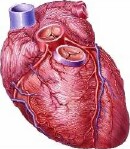
THURSDAY, Dec. 3 (HealthDay News) — New research points to the possibility of a genetic link between vitamin D and heart disease.
People with high blood pressure who had a gene variant that reduces vitamin D activation in the body were found to be twice as likely as those without the variant to have congestive heart failure, the study found.
The finding may lead to a way to identify people at increased risk for heart disease, according to Robert U. Simpson, an assistant professor of pharmacology at the University of Michigan Medical School and his research colleagues.
They analyzed the genetic profiles of 617 people. One-third had hypertension, one-third had hypertension and congestive heart failure, and the remaining third served as healthy controls.
The researchers found that a variant in the CYP27B1 gene was associated with congestive heart failure in people with hypertension. The study is in the November issue of Pharmacogenomics.
Previous research showed that mutations that inactivate the gene reduce the conversion of vitamin D into an active hormone.
“This study is the first indication of a genetic link between vitamin D action and heart disease,” Simpson said in a news release from the University of Michigan.
“If subsequent studies confirm this finding and demonstrate a mechanism, this means that, in the future, we may be able to screen earlier for those most vulnerable and slow the progress of the disease,” he added.
More information
The American Heart Association has more about congestive heart failure.

